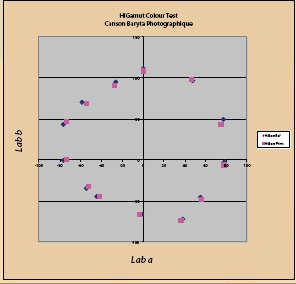

articles/Paper/barytaroundup-page1
Paper Chase Baryta Roundup - part 1 of 1 2 3 4
by Mike McNamee Published 01/10/2013

Round up? It's been more like herding cats!
Mike McNamee attempts to shepherd baryta papers into the right pens and unravel some of the mysteries of this inkjet paper type.
Since PaperChase has been running we have collated more than 9,000 audit files and analyses in 762 folders. The 'Baryta' or 'Fibre Based' types of paper are a specialised case; we first collated them in 2007 and, most recently, failed to do so in 2011. We felt it was time to knuckle down and round up the strays once again. Our tardiness in completing the task arises from the anticipated confusion of re-branding, re-boxes and new launches that seems to revolve around papers today.

The true baryta papers have a barite (barium sulphate, BaSO4) coating, but only a handful of the papers that bear the name 'baryta' or 'fibre based' contain the mineral in the coating. For our purposes, then, we have lumped together papers which attempt to mimic the surface properties and feel of the traditional air-dried, fibre-based, silver halide papers, typified historically by such revered names as Ilford Galerie and Agfa Record Rapid. While their characteristics, such as weight (grammage), base fibre (cotton rag, alpha cellulose or mixtures), brightness (as controlled by optical brightening agents, OBAs), stiffness (thickness and base fibre related) and finally cost, vary greatly, they form a cohesive statistical group by virtue of their outstanding colour accuracy when we audit them. Our best stats of all time come from this group of papers.
The bulk of the papers are around 300gsm, quite stiff to handle, slightly more expensive and generally have a slightly undulating finish with a moderate gloss. All other parameters outside of this clustering are as variable as any other collection of inkjet papers. There is a slight, but not universal, tendency to employ an alpha cellulose base fibre.
The majority of the media employ pigment and specifically Epson Photo Black inks - there are just a couple of matt papers requiring Mk ink and even some canvas baryta medias. This brings us to our first problem - many of our legacy data relate to older ink sets. In rough terms the gamut of our predominantly Epson ink sets has risen progressively through UltraChrome K3, UltraChrome K3 Vivid Magenta to K3 UltraChrome Vivid Magenta HDR. If this moving target is not enough, we have also thrown in better profiling software and more stringent audit testing. Also, as well as increasing the gamut, the newer ink sets have improved metamerc characteristics. OBAs have remained a thorn in the side, disproportionately degrading the statistics but not always the 'look' of a finished print.
- Paper Chase Baryta Roundup page 1
- Paper Chase Baryta Roundup page 2
- Paper Chase Baryta Roundup page 3
- Paper Chase Baryta Roundup page 4
1st Published 01/10/2013
last update 20/07/2022 13:53:41
There are 0 days to get ready for The Society of Photographers Convention and Trade Show at The Novotel London West, Hammersmith ...
which starts on Wednesday 14th January 2026





